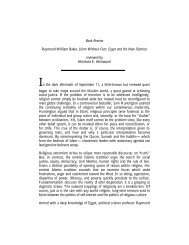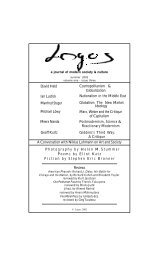Michael J. Thompson Stephen Eric Bronner Wadood Hamad - Logos
Michael J. Thompson Stephen Eric Bronner Wadood Hamad - Logos
Michael J. Thompson Stephen Eric Bronner Wadood Hamad - Logos
You also want an ePaper? Increase the reach of your titles
YUMPU automatically turns print PDFs into web optimized ePapers that Google loves.
Stanley Aronowitz<br />
genuine knowledge from which to adduce opinion to slogans by the mass<br />
media, and the growing role of the state. For a society of citizens, in the sense<br />
of the Greek city-state, who are capable of making the vital decisions affecting<br />
the polity, he held out no hope. Given the conditions for its formation, the<br />
public was shortsighted, prejudiced and, most of all, chronically ill-informed.<br />
While defending the claim that the élite of experts, which came into its own<br />
with the consolidation of the modern state and the modern corporation, was<br />
as desirable as it was inevitable in complex societies, Lippmann retained a trace<br />
of his former socialist skepticism. He wanted a democratic public to force<br />
experts and political leaders to obtain consent on a regular basis and, through<br />
the ballot, to pass judgement on their quasi-sovereign actions. Thus,<br />
democracy was conceived purely negatively, as the barrier against authoritarian,<br />
technocratic rule.<br />
Deeply affected by this powerful argument against participatory democracy,<br />
John Dewey was moved to respond. The Public and its Problems (1925) is, for<br />
all intents and purposes, the most penetrating case for an active polity and for<br />
radical democracy any American has ever written. With Dewey, Mills held that<br />
the promiscuous use of the term “democracy” to describe the de facto<br />
plebiscite of electoral politics, and other mechanisms by which consent is<br />
achieved by representative political institutions, is unwarranted. The<br />
institutions of the liberal state still need the consent of the governed. But the<br />
legislative and executive branches are increasingly beholden to the holders of<br />
institutional power, not their electors, except insofar as the public refuses to<br />
confer consent to policies which they perceive to be contrary to their interests<br />
and, as in the case of social security “reform,” succeeds in staying the hand of<br />
legislators beholden to corporate power, at least for a time. Having entered<br />
into an alliance with the military and corporate orders, the political directorate<br />
becomes a self-contained body, undemocratic in both the process of its<br />
selection and its maintenance.<br />
Dewey’s concept of democracy recalls the New England town meeting in<br />
which the “public” was not a consumer of the work of active and influential<br />
people, but a participant, a decision-maker, in the community’s political and<br />
social life. In this respect, it is important to recall Mills’s “Letter to the New<br />
Left” (1960). The letter outlined the principles of participatory democracy on<br />
the basis of Dewey’s concept of the public, and was, perhaps, the single most<br />
<strong>Logos</strong> 2.3 – Summer 2003




